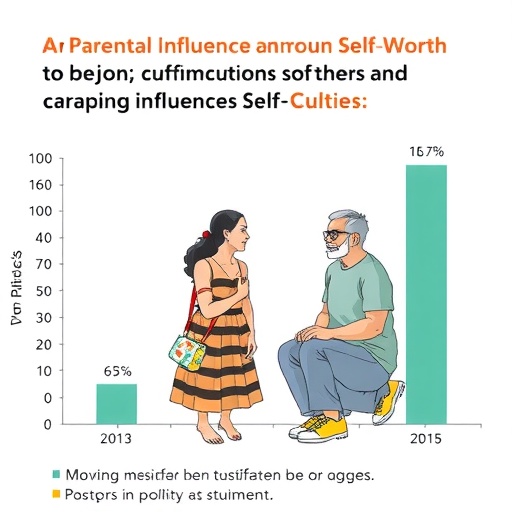Parental influence is a topic that often permeates discussions in psychology, especially regarding the development of self-worth in young adults. The research conducted by Farber, Alexander, and Barry provides an insightful perspective into this intricate domain. Their study focuses on two specific cultural groups: Asian-Americans and European-Americans, analyzing how parental psychological control impacts the perception of legitimate authority, ultimately shaping the self-worth of emerging adults in these communities. This exploration is not merely academic; it is crucial for understanding how cultural variances inform psychological outcomes in youth.
The correlation between parental psychological control and the self-worth of their children has long been a point of inquiry in psychological literature. For many, self-worth is a fundamental aspect of psychological well-being, influencing decisions, relationships, and overall life satisfaction. The authors pinpoint parental psychological control as a potentially detrimental factor, particularly when it manifests in overly restrictive or manipulative behaviors. This kind of control can lead to feelings of inadequacy and diminished self-worth in children, as they internalize negative perceptions about themselves based on their parents’ expectations.
Moreover, the study discusses the concept of perceived legitimate authority, which plays a crucial role in shaping how young adults view authority figures in their lives. The researchers argue that when parental authority is perceived as legitimate, it can foster a healthy dynamic between parents and children, one characterized by mutual respect and understanding. Conversely, if parental control is seen as excessive or unjust, it can erode this perception of legitimacy, leading to a heightened sense of rebellion and disconnection in the child’s adult years.
The focus on Asian-American and European-American emerging adults offers a unique comparative analysis. Cultural narratives deeply influence parenting styles, and these styles can vary dramatically across cultures. For instance, Asian-American parenting often emphasizes academic excellence and obedience, while European-American parenting may promote individuality and self-expression. By studying the interplay of these cultural frameworks, the authors shed light on how self-worth is constructed differently across cultural contexts.
The significance of the findings cannot be overstated. Parents serve as the primary architects of their children’s self-image. As emerging adults grapple with identity formation, understanding their self-worth becomes paramount. The research illustrates that Asian-American emerging adults may face unique challenges due to heightened parental expectations, leading to a potential conflict between personal aspirations and familial obligations. This struggle can result in a fragile sense of self, shaped significantly by their perception of authority within their family structures.
In contrast, European-American emerging adults may possess a more robust sense of self-worth, potentially due to the encouragement of personal expression and the acceptance of imperfection within their family dynamics. However, it’s essential to note that this does not mean that European-American youth are devoid of challenges. They might also experience pressures related to conformity, albeit in different contexts than their Asian-American peers.
The researchers further elaborate on the methodologies employed in their study, which includes quantitative measures and qualitative interviews. These tools provide a comprehensive understanding of how young adults perceive their parents’ authority and its implications on their self-worth. By utilizing a mixed-methods approach, the authors ensure that their findings are grounded in empirical evidence, making a compelling case for the importance of cultural context in psychological research.
The implications of this study extend beyond academic theorizing. The insights garnered can inform therapeutic practices, particularly for psychologists and counselors who work with young adults from diverse cultural backgrounds. By understanding the unique challenges faced by these populations, professionals can tailor their approaches to better address the nuanced needs of their clients.
One of the key takeaways from the research is the crucial importance of fostering a parent-child relationship that promotes open communication and mutual respect. For parents, understanding the impact of their psychological control can lead to more supportive parenting techniques that nurture self-worth, rather than diminish it. Empathetic parenting can encourage young adults to develop their identities in a way that aligns with both personal aspirations and cultural expectations, ultimately fostering a healthier self-image.
Furthermore, the study emphasizes the importance of dialogue around mental health in both Asian-American and European-American communities. By bringing awareness to how parental control affects self-worth, these discussions can help dismantle stigmas surrounding mental health issues. Encouraging openness about emotions and experiences within families can foster healthier relationships and enhance self-acceptance among young adults.
The exploration of these dynamics lays the groundwork for further research into the complexities of identity formation across different cultural groups. As the study indicates, understanding the nuances of parental influence can significantly contribute to developing strategies aimed at promoting psychological well-being in emerging adults.
In conclusion, the intricate relationship between parental psychological control, perceived legitimate authority, and self-worth provides a rich area for exploration. Farber, Alexander, and Barry’s research underscores the importance of cultural context in understanding psychological outcomes among young adults. As societies evolve, and as family structures continue to adapt, the dialogue surrounding these issues remains ever-relevant. The implications of their findings extend into real-world applications, demonstrating the necessity of fostering healthy, communicative relationships between parents and their children to ensure robust self-worth in the youth of today.
Subject of Research: Relationships Among Parental Psychological Control, Perceived Legitimate Authority, and Self-Worth in Emerging Adults
Article Title: Relations Among Parental Psychological Control, Perceived Legitimate Authority, and Self-Worth in Asian-American and European-American Emerging Adults
Article References:
Farber, D.V., Alexander, A.J., Barry, C.M. et al. Relations Among Parental Psychological Control, Perceived Legitimate Authority, and Self-Worth in Asian-American and European-American Emerging Adults.
J Adult Dev (2025). https://doi.org/10.1007/s10804-025-09515-z
Image Credits: AI Generated
DOI:
Keywords: Parental Psychological Control, Self-Worth, Emerging Adults, Cultural Differences, Asian-American, European-American, Authority Perception, Psychological Well-being.




